8 Surprising Effects of Cottage Cheese
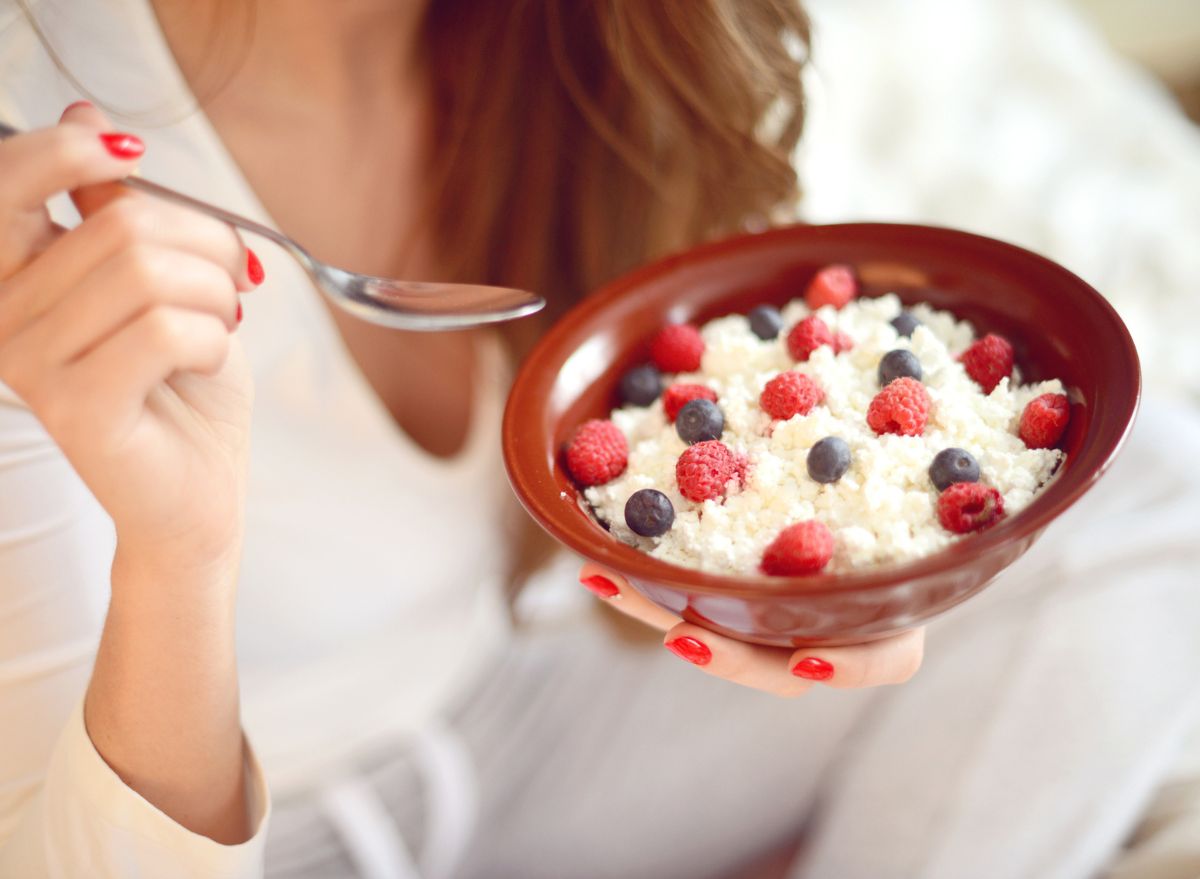
It's cottage cheese's time to have the dairy aisle spotlight, and there are now so many creative ways to enjoy this high-protein snack. In the past, people used to just enjoy it in its original form with their favorite fruit and some honey, but with its resurgence, cooks have developed cottage cheese recipes to make bread, dip, dressing, pancakes, mac and cheese, cookie dough, and even ice cream. But with all of the viral recipes taking the internet by storm, it leaves us to wonder if there are actual benefits of cottage cheese, or if it's all just another fad that will disappear sooner than later.
Before we look at the potential cottage cheese benefits, let's take a look at what it actually is. Made by adding acid to milk, cottage cheese is the result of the milk solids separating from the liquid whey. Rather than straining away all of the whey as you would with most cheeses, some of that liquid remains in cottage cheese, creating its creamy consistency.
Because it is still a type of cheese, many people automatically assume that it's bad for you. However, cottage cheese does offer many health benefits as it's high in protein, low in fat, and contains hearty doses of important vitamins and nutrients that are essential for your daily life.
Read on to learn more about 8 major cottage cheese benefits, and for more healthy eating tips, check out The 8 Best Cottage Cheese Brands, According to Dietitians.
You'll get a dose of vitamin B12.
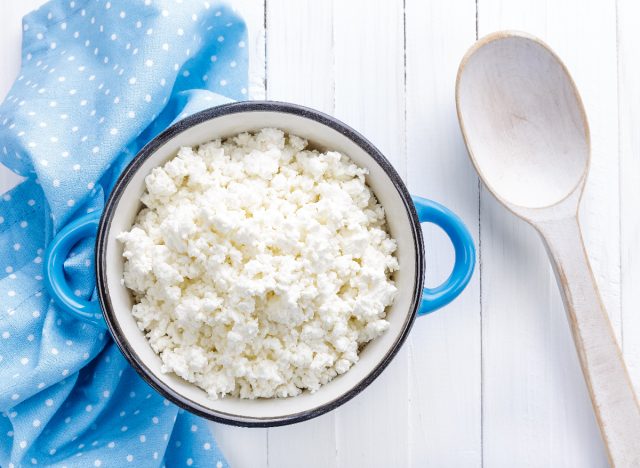
Whether you're enjoying it on its own or as a bowl of protein-packed ice cream, cottage cheese will provide you with a helpful dose of vitamin B12. In a one-cup serving of 2% cottage cheese, you'll get about 0.9 micrograms of this B vitamin. That may not seem like a lot, but with the daily recommended value being around 2.4 micrograms for adults, this type of cheese serves up 38% of your daily value, making a significant dent in your daily amount.
But why do you need B12? This vitamin is necessary for healthy cognitive function, as well as blood and nerve health. A deficiency in vitamin B12 can lead to things like muscle weakness, fatigue, depression, and memory loss. To make sure you're getting enough B12 in your day-to-day routine, try incorporating a serving of cottage cheese however you like it.
Cottage cheese contains another important B vitamin: B2.
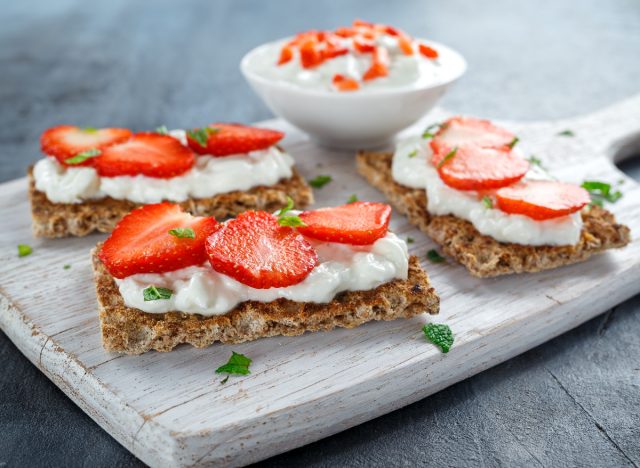
Another type of B vitamin that isn't discussed as much as the others is B2, also known as riboflavin. This lesser-known vitamin is still crucial to your health, and one cup of cottage cheese gets you close to 50% of your recommended daily value.
Riboflavin is needed for the functioning of certain enzymes throughout the body and can help provide energy, and some studies have found that supplementing this vitamin may help ease migraines. What's even more important is that a deficiency in B2 can lead to fatigue, depression, and liver issues in more severe cases.
You'll get a boost of protein.
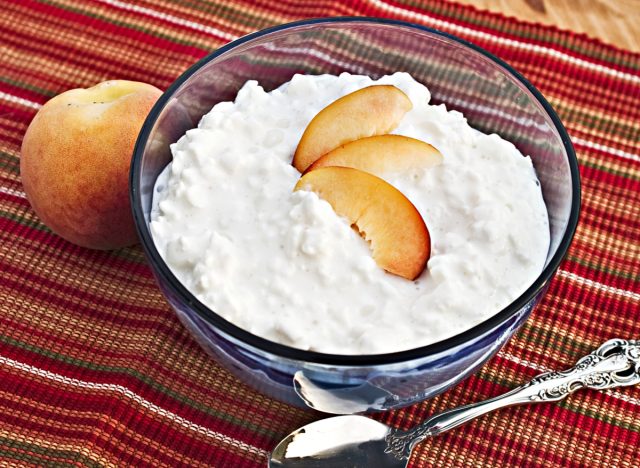
One of the most talked about benefits of eating cottage cheese is the large protein boost you'll get. For example, there are about 24 grams of protein in just one cup of standard 2% cottage cheese, which is comparable to a plain 2% Greek yogurt like Fage.
Not only do you get to enjoy a boost of protein, but you can do so with the peace of mind that you're consuming a low amount of sugar (about 9 grams, mostly from lactose) and zero added sugar. This gives you the freedom to add your own sweetness, either with fruit or a drizzle of honey.
You can build more muscle.
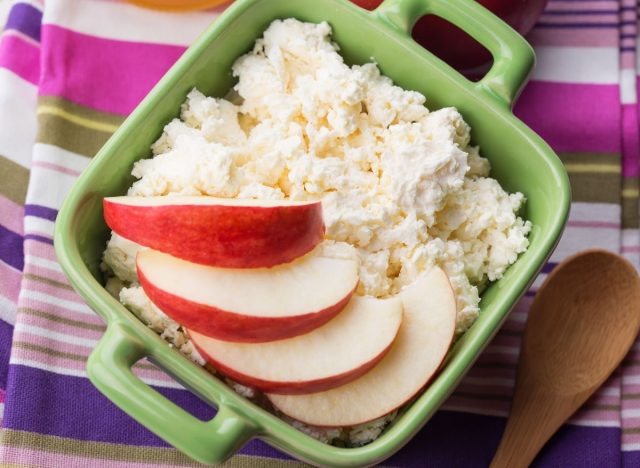
The protein in this versatile cheese can help you in a number of ways, but a particular type of protein that accounts for the majority of protein in cottage cheese can help you achieve your goals of building more muscle—even while you're at rest.
Protein in general is necessary for muscle building, but cottage cheese is largely made up of a type of protein called casein—one of the two types of animal proteins alongside whey. While both of these proteins are helpful in the process of gaining more muscle mass and are both complete proteins (meaning they contain all nine essential amino acids), casein is considered a slower-release protein because it is more slowly absorbed. Because of this, many people have been known to take it before sleep or a period of rest and still reap its benefits. It isn't more effective than whey in muscle building, but it can work overnight even while you're sleeping.
You will consume some of your daily recommended levels of selenium.

There is a nutrient that not many people talk about but is one that more people should acknowledge because of its importance to your health. Selenium—which is found in fish, poultry, and dairy—is a crucial micronutrient for helping to prevent cardiovascular disease, thyroid disease, cognitive decline, and even some cancers. And if you enjoy a cup of 2% cottage cheese, you're treating yourself to about 58% of your recommended daily value.
Even though selenium is necessary for healthy functioning, just make sure you're not overdoing it. For instance, have you ever heard someone tell you not to eat more than a couple of Brazil nuts? That's because each nut contains anywhere between 60-90 micrograms, but there is an upper limit of about 400 micrograms of selenium per day. With too much of this micronutrient, you may start to experience nausea, diarrhea, and even problems with your nervous system.
You'll also get a calcium boost.
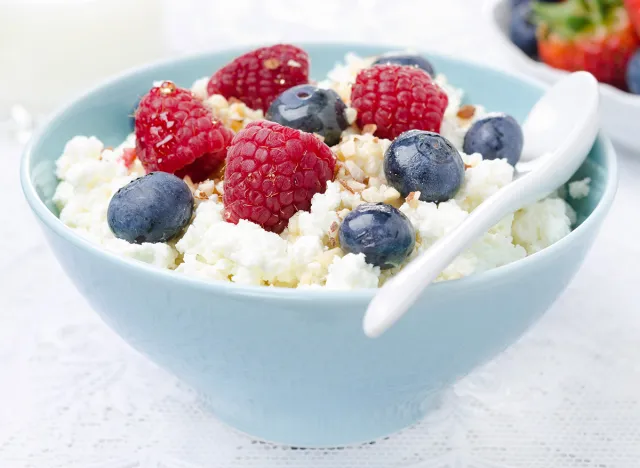
Cottage cheese is also an excellent source of calcium. One cup of 2% cottage cheese comes with 227 milligrams of calcium which is about 18% of your recommended daily value. This is comparable to a cup of nonfat Greek yogurt, so if you're getting tired of eating yogurt and need to switch it up, cottage cheese is a great choice.
Calcium is excellent for your bone health, hormone health, and can even aid in preventing or managing various diseases. So grab a cup of cottage cheese or blend some into your next snack to get yourself one step closer to your calcium goals for the day.
It may help promote weight loss.
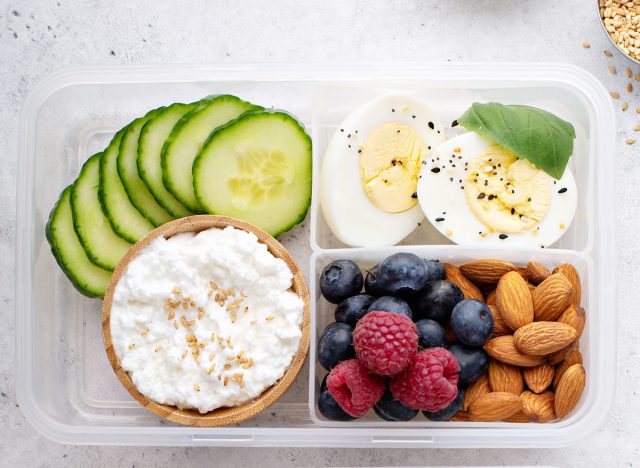
Cottage cheese is a low-fat, high-protein snack that can help aid in your weight loss goals. Studies show that eating healthy foods that are high in protein is extremely effective for weight loss because it increases satiety and leaves you feeling full for longer periods of time.
Research also suggests that eating larger amounts of added sugar on a regular basis can contribute to weight gain and increased calorie intake. Switching out super sugary desserts for some cottage cheese topped with fruit or honey is a great way to satisfy a craving and eliminate some calories from added sugar.
You can enjoy its nutrients without a lot of fat.
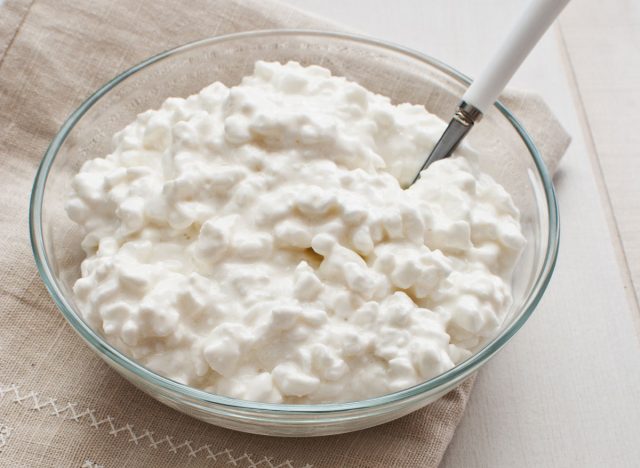
Another amazing cottage cheese benefit is that you get a nutritious, filling snack with very few calories from fat. Many people may be weary of snacking on cottage cheese because it has cheese in the name, but the fat content of cottage cheese is different than most other types.
As a comparison, let's look at cheddar cheese. Cheddar does provide a nice boost of protein (24.5 grams per cup), but you're also consuming almost 35 grams of fat. You can get the same amount of protein in a cup of low-fat cottage cheese with only 5 grams of fat! While fat is not necessarily bad for you, gram for gram, it is higher in calories than nutrients like protein or carbs—with 9 calories per gram as opposed to just 4—making cottage cheese a lower-calorie snack than other fatty dairy products.
- Source: https://fdc.nal.usda.gov/fdc-app.html#/food-details/328841/nutrients
- Source: https://www.mayoclinic.org/drugs-supplements-vitamin-b12/art-20363663#:~:text=While%20the%20recommended%20daily%20amount,excess%20passes%20through%20your%20urine.
- Source: https://ods.od.nih.gov/factsheets/VitaminB12-Consumer/#:~:text=Vitamin%20B12%20is%20a%20nutrient,makes%20people%20tired%20and%20weak.
- Source: https://www.hsph.harvard.edu/nutritionsource/riboflavin-vitamin-b2/
- Source: https://pubmed.ncbi.nlm.nih.gov/26780280/
- Source: https://www.ncbi.nlm.nih.gov/books/NBK470460/#:~:text=Riboflavin%20deficiency%20can%20cause%20fatigue,occur%20along%20with%20reproductive%20issues.
- Source: https://www.ncbi.nlm.nih.gov/pmc/articles/PMC5477153/
- Source: https://ods.od.nih.gov/factsheets/Selenium-Consumer/#:~:text=sheet%20on%20Selenium.-,What%20is%20selenium%20and%20what%20does%20it%20do%3F,free%20radicals%20and%20from%20infection.
- Source: https://pubmed.ncbi.nlm.nih.gov/24576174/
- Source: https://ods.od.nih.gov/factsheets/Calcium-Consumer/#:~:text=Your%20body%20needs%20calcium%20for,many%20functions%20in%20your%20body.
- Source: https://www.ncbi.nlm.nih.gov/pmc/articles/PMC5015032/
- Source: https://openheart.bmj.com/content/3/2/e000469









